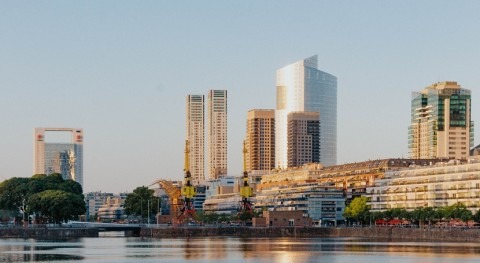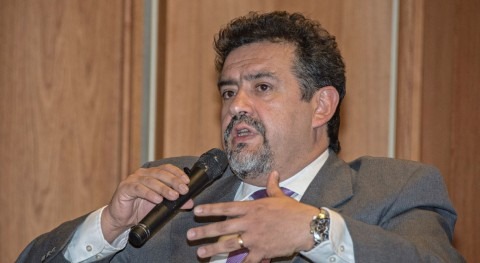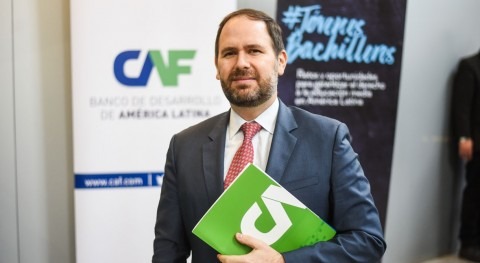On November 28th, at 3:30 pm (CET), CAF - Development Bank of Latin America and the Caribbean, in collaboration with the Spanish Ministry of Ecological Transition and Demographic Challenge (MITERD) and the Spanish Ministry of Economic Affairs and Digital Transformation, is organising a new edition of the Water Dialogues in Madrid, at the headquarters of the MITERD. In this ninth edition, experts and leaders in the field of water and sanitation will meet to establish a dialogue around the challenges in financing the investments needed to meet the targets set in SDG 6 and the SDGs related to water.
One of these leaders is Santia Bradshaw, Deputy Prime Minister and Minister of Transport, Works and Water Resources of Barbados, who will participate in a high-level panel in the session dedicated to innovative financing for water security.
Question: Water Management and Tourism in Barbados: Given the geographical characteristics of Barbados, famous for its tourism but facing high water stress, how does your country balance these two realities? What are the main strategies and goals for 2030 regarding the provision of water and sanitation services?
Answer: In addressing water management in the context of tourism in Barbados, the Government has integrated several strategies within the Barbados Tourism Master Plan 2014-2023, focusing on sustainable tourism growth and balancing ecological needs with economic development.
The National Tourism Policy emphasizes creating a conducive environment for sustainable tourism by enhancing human and community development, improving infrastructure and transportation, and focusing on investment and product development. Integral to this policy is the involvement of local communities, ensuring a people-centered approach in tourism development.
A critical aspect of managing the delicate balance between tourism and water resources is the Tourism Carrying Capacity Study initiated in 2022. This study, prompted by the pandemic's impact, aims to establish a balance between economic, environmental, and social factors in tourism redevelopment. Its objectives include determining the physical, ecological, social, and economic carrying capacities, establishing measurement criteria, setting maximum capacity thresholds, and recommending capacity-increasing mitigation measures.
In addressing water management in the context of tourism in Barbados, the Government has integrated several strategies within the Barbados Tourism Master Plan 2014-2023
Preliminary results indicate that Barbados' physical carrying capacity stands at approximately 14,848 visitors per day. This capacity takes into account the size and space of tourist-related activities and properties. However, the development of the tourism sector is advised not to solely focus on tourist numbers but also on environmental preservation and economic benefits.
Given that tourism is a significant user of freshwater resources, there is an increased focus on conservation, treatment, and reuse of water. This includes exploring legal instruments to address pollution and enforcing regulations to mitigate pollutant sources. The government's actions, though currently limited by the existing legislative framework, are guided by key legal instruments focusing on ecological conservation and sustainable tourism development.
These initiatives represent Barbados' commitment to balancing its tourism appeal with responsible water management, aiming towards a sustainable and ecologically responsible future.
In a water-stressed environment, which Barbados is in, the realities of tourism and water stress are balanced by ensuring sustainable and equitable access to water and sanitation services. This becomes crucial for the well-being of the population and overall development of the country. The main strategies and goals for 2030 regarding the provision of water and sanitation services are:
1. Water Conservation and Efficiency
- Implementation of water conservation measures to reduce overall water demand.
- Promotion of water-efficient technologies and practices at the household level as well as in Agriculture and commercial.
- Investment in the maintenance and improvement of water infrastructure to minimize leaks and losses.
2. Integrated Water Resource Management (IWRM)
- Development and implementation of comprehensive IWRM plans that consider the entire water cycle (e.g. roof to reef programme).
- Balancing competing water uses, such as agriculture, domestic consumption and commercial activities, to ensure sustainable resource allocation.
3. Infrastructural Development
- Investment in the construction and maintenance of water supply and sanitation infrastructure (e.g. construction of new reservoirs, rehabilitation of existing reservoirs and pumping stations, upgrade of the Bridgetown Sewage Treatment Plant (BSTP) and the South Coast.
- Sewage Treatment Plant (SCSTP) from primary to tertiary levels plants).
- Implementation of decentralized and innovative solutions, such as rainwater harvesting and wastewater reuse, to supplement traditional water resources.
4. Community Engagement and Participation
Raising awareness about the importance of water conservation and hygiene practices
5. Policy and Regulatory Framework
- Develop and enforce effective water and sanitation policies and regulations (e.g. Water Reuse Bill, Water Protection Zone Order, etc.).
- Ensure that water pricing reflects the true value of water to encourage conservation.
6. Climate Change Adaptation
- Incorporation of climate change considerations into water management strategies to address changing precipitation patterns and increased variability.
- Development and implementation of adaptation measures to mitigate the impact of extreme weather events on water resources (e.g. modifying drainage systems, construction of detention ponds, etc.).
7. Capacity building
- Strengthening institutional and human capacity for effective water governance and management.
- Provide training for water professionals to enhance their skills in waterrelated issues (e.g. USAID funded training, etc.).
8. Monitoring and Data collection
- Establish robust monitoring and data collection systems to track water availability, quality, and usage (e.g. installation of weather stations across the island by Barbados Meteorological Services, groundwater monitoring network, etc.).
Q. Response to Natural Disasters: With the imminent El Niño phenomenon and the risk of storms and hurricanes, how is Barbados preparing to mitigate possible disasters and guarantee water supply?
A: Responding to the challenges posed by natural disasters, particularly the El Niño phenomenon and the risk of storms and hurricanes, Barbados has implemented several measures to mitigate potential disasters and ensure a stable water supply.
Firstly, the government has focused on strengthening infrastructure resilience. This includes upgrading water supply networks to withstand extreme weather conditions, ensuring continuous access to water during and after disasters. Measures such as reinforcing storage facilities, securing pipelines, and enhancing water treatment plants are pivotal in this regard.
Given that tourism is a significant user of freshwater resources, there is an increased focus on conservation, treatment, and reuse of water.
Additionally, Barbados invests in emergency preparedness and response plans. These plans involve comprehensive risk assessments, the development of early warning systems, and the establishment of disaster response protocols. Regular drills and community engagement programs are conducted to raise awareness and prepare citizens for potential disasters.
Water conservation and storage strategies are also critical. The government promotes rainwater harvesting and the development of sustainable water resources. This not only diversifies the water supply but also ensures adequate reserves in the event of disrupted services during natural disasters.
Moreover, Barbados collaborates with international organizations and neighboring countries to share best practices and resources. This regional cooperation enhances disaster preparedness and facilitates rapid response and recovery efforts.
In summary, Barbados' approach to mitigating the impacts of natural disasters and ensuring water supply includes strengthening infrastructure, enhancing emergency preparedness, promoting water conservation, and engaging in regional cooperation. These measures collectively contribute to the country’s resilience in the face of environmental challenges.
Q: Last August, Barbados increased its contribution to CAF - Development Bank of Latin America and the Caribbean. CAF serves as an agile development bank for all the countries of the region by offering innovative options for financing, technical assistance and knowledge generation. In view of this commitment on the part of CAF how does Barbados plan to leverage its membership of the Bank to impact the water and sanitation sector and fulfil commitments under SDG 6?
A: Barbados, in its commitment to advancing Sustainable Development Goal 6, has bolstered its partnership with CAF to enhance its water and sanitation sector. A pivotal aspect of this collaboration is the Letter of Intent signed between CAF and the Government of Barbados in September 2023. This agreement focuses on developing and implementing national strategies related to water security, prioritizing water availability for multiple uses, especially human consumption, and accelerating sanitation provision. The collaboration also encompasses efforts to reduce water body contamination and manage droughts and floods effectively.
Barbados, in its commitment to advancing Sustainable Development Goal 6, has bolstered its partnership with CAF to enhance its water and sanitation sector
An integral component of this partnership is the Barbados Water Infrastructure Rehabilitation Project, partially financed by CAF. This project is aimed at improving the quality, reliability, and efficiency of Barbados' potable water systems. Furthermore, it involves formulating a sector strategy through the preparation of a Master Plan. This project aligns with CAF's Water Security Strategy 2023-2026, committed to providing technical and financial resources to enhance water security in Barbados and the region. The strategy addresses crucial challenges such as economic reactivation, where water security is essential, and increasing climate resilience through strategic and rational water use.
More generally, Barbados plans to leverage its CAF membership to impact its water and sanitation sector through accessing financial resources for critical projects, obtaining technical assistance to build local capacity, and engaging in knowledge exchange to adopt best practices in water management and conservation.
Q: Considering the relevance of tourism, how is Barbados preparing for more efficient water management to promote and support sustainable tourism? Also, what is your vision for water management in Barbados for the next decade?
A: The current Tourism Master Plan ends in 2023 which gives the Ministry of Tourism and the Ministry of Transport, Works and Water Resources a chance to reshape the kinds of interventions can reap the benefits of a cleaner and sustainable island state.
In 2014 there was found to be a lack of agreed sustainability vision for the sector. Today, Barbados has a strong vision captured by its Roofs to Reefs programme and its NetZero 2030 policy, as announced in the Barbados National Energy Plan and its Nationally Determined Contribution commitments. These documents contain a roadmap to achieve the 100% renewable energy and carbon neutral island-state, as well as a path to resilience to the impacts of climate change.
In alignment with Barbados' National Energy Plan and its ambitious Net Zero by 2030 target, the country is gearing towards efficient water management in tourism, focusing on renewable energy sources and sustainable practices. This approach includes utilizing solar-powered water heating and desalination systems to support sustainable tourism, contributing to both energy and water conservation goals over the next decade.
The Government of Barbados announced at the Summit for a New Global Financing Pact in Paris an integrated package of innovative initiatives to accelerate its transition to net zero
On the climate resilience side, Barbados is actively implementing measures aligned with its Roofs to Reefs programme and Nationally Determined Contributions (NDCs) policy. The Roofs to Reefs approach, which emphasizes holistic environmental management from the household level to the coastal ecosystems, plays a key role in this strategy. Over the next decade, the vision is to integrate efficient water use and sustainable practices within the tourism sector, ensuring that the industry's growth is in harmony with environmental conservation. This includes promoting water-saving technologies, rainwater harvesting, and sustainable infrastructure, all aimed at achieving a balance between tourism development and water resource sustainability.
At the global level, the Prime Minister of Barbados has been a champion for Net-Zero and Financing Sustainability for small island states. Advanced economies, which contribute the most to greenhouse gases emissions will continue to do so, and continue the exploration of their own fossil fuel resources. However, small and heavily indebted developing island states cannot carry the costs of adaption, and although there is currently more momentum in the private sector for financing net zero projects, this does not alleviate the urgent need in adaptation investment, as such projects are not generally appropriate to "go to market and access funds easily".
Therefore, the Government of Barbados announced at the Summit for a New Global Financing Pact in Paris an integrated package of innovative initiatives to accelerate its transition to net zero, boost resilience, enfranchise workers, and draw in private sector investment while prudently managing public debt levels. These initiatives build on the ongoing climate policy reforms, supported by the Resilience and Sustainability Facility with the International Monetary Fund, which are expected to play a catalytic role in mobilizing private and public sector financing for climate projects.
For the Tourism Sector the Future will entail:
- Increased engagement and product development for domestic tourists.
- A strengthened legal and regulatory framework.
- Increased capacity for regulatory monitoring programmes and inter-agency coordination.
- Increased ICT use, sector aggregation and centralisation of monitoring data.
- Greater focus on sustainability metrics in addition to economic performance metrics.
- Increasing access to investment capital for retrofitting of buildings.
- Increased valuation of the contribution of ecosystem services to tourism.
- Reduced habitat fragmentation and better land-use policies.
Q: In view of the next edition of the 9th “Latin America and The Caribbean- Spain Water Dialogues”, what are your expectations and main contributions for this event?
A: As Deputy Prime Minister of Barbados, I approach the 9th "Latin America and The Caribbean-Spain Water Dialogues" with high expectations for shared progress and resilience in water resource management. Barbados, through initiatives like our Roofs to Reefs programme, exemplifies our dedication to holistic environmental stewardship, integrating sustainable practices from individual households to expansive coral reefs. In this dialogue, I intend to share our journey and innovations, focusing on how we have embedded resilience and sustainability in our policies and actions. Furthermore, I look forward to learning from the experiences of other nations, as collective wisdom is key in addressing the global challenges of water management and environmental sustainability. This event represents a significant opportunity for collaborative learning and mutual growth, fostering a deeper understanding of effective water management strategies that can be adapted and implemented across diverse geographical and cultural contexts.


















